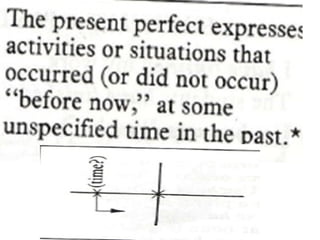Recommended
More Related Content
What's hot
What's hot (20)
Used to, get used to be used to and would slideshare 

Used to, get used to be used to and would slideshare
Viewers also liked
Viewers also liked (20)
Similar to Present perfect yet - just - already
Similar to Present perfect yet - just - already (20)
pengertian past dan simple future tense sman 3 nganjuk

pengertian past dan simple future tense sman 3 nganjuk
2 tabla tiempos.pdf de inglés segundo de bachiller

2 tabla tiempos.pdf de inglés segundo de bachiller
More from nelsyb
More from nelsyb (16)
Present perfect yet - just - already
- 7. JUST Use just to express actions that have happened VERY RECENTLY. - Maria has just finished her homework. (not so long ago) - They have just come from the supermarket. - It has just started raining. Use it after the auxiliary have/has and before the past participle (+)
- 8. Already We use "already" to express actions that have finished before the actions was expected to finish. - I have already done my homework. OR - I have done my homework already . - Jorge has already watched "Transformers" the movie. - They've already read that book OR - They've read that book already Use it either between have/has and the past participle or at the end of the sentence. (+)
- 9. Yet We use yet for negative sentences and questions. It is used for actions that you think has happened. It is used to express expectations. - Have you eaten at "Friday's" yet ? (you expect that the other person has already been to "Friday's") - I haven't been to Europe yet . (But I expect to go there) - Has Matilda been to New York yet ? - Have you studied for the test yet ? - Juan hasn't proposed to Jenny yet . Use it at the end of the sentence. (-) (?)
- 10. Exercises: http://www.oup.com/elt/global/products/englishfile/preint/a_grammar/file04/grammar04_b01/ Game: http://www.oup.com/elt/global/products/englishfile/intermediate/i_games/gotoschool/nef_int_games_gts02/
